PESHAWAR: The name of Sirajuddin Haqqani, Afghanistan’s acting interior minister and the Taliban’s second-in-command, started echoing around the world in 2008 as a young commander of the most-feared Haqqani Network that was executing a series of deadly attacks on US-allied forces in Afghanistan.
The powerful Taliban commander has once again been in the headlines after he revealed his face in a rare public appearance in Kabul this week.
Haqqani was attending the graduation ceremony of the first batch of police recruits at the National Defense Police Academy in Kabul since the Taliban took over the reins of Afghanistan.
“I never came before the media, but today I am appearing in front of the media for you so that I can gain your trust and so that you know your value and importance,” Haqqani, who also goes by the name of Khalifa, said in his address.
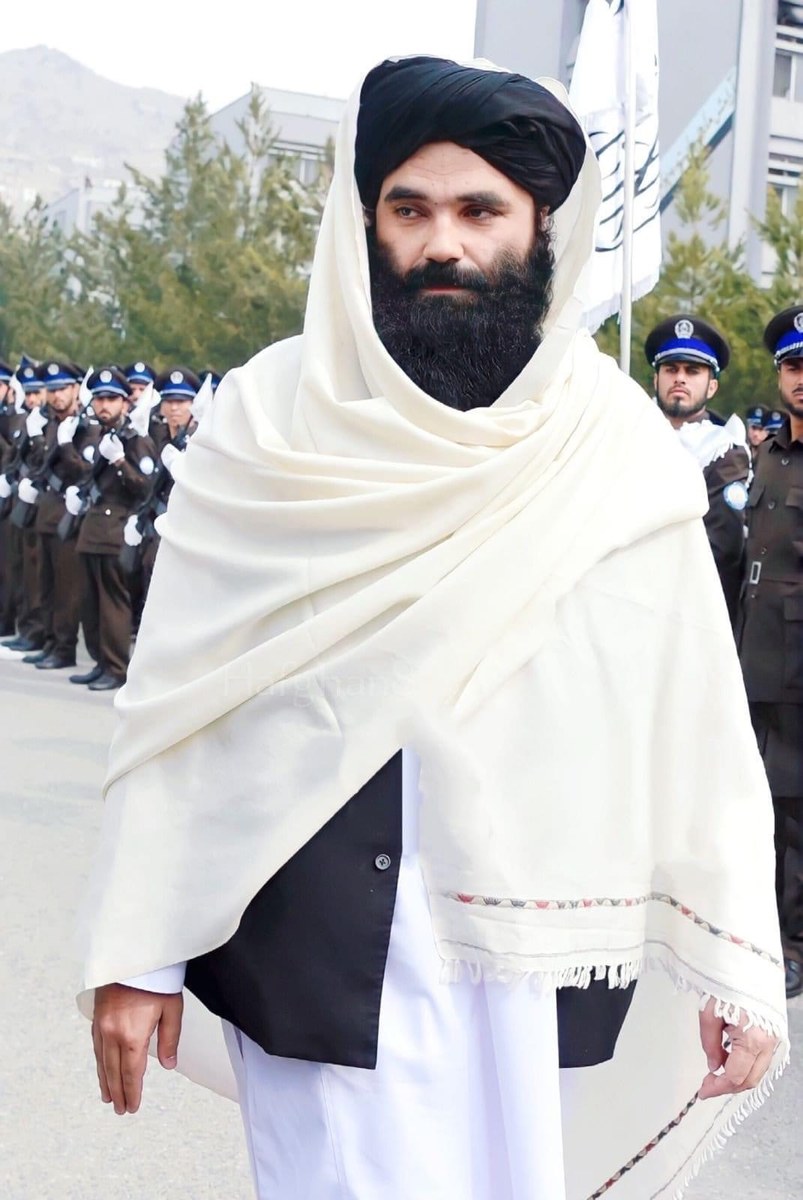
Afghanistan's acting Interior Minister Sirajuddin Haqqani inspects recruits at the police graduation ceremony at the National Defense Police Academy in Kabul, Afghanistan on March 5, 2022. (IEA)
During the address that lasted around 30 minutes, he reiterated the Taliban’s stand of not allowing the use of Afghanistan’s soil against any foreign state, and the interim government’s commitment to providing unhindered access to humanitarian organizations and their staff in Afghanistan.
While his younger brother, Anas Haqqani, frequently appeared on media since his release in November 2019 after spending over five years in American captivity in Afghanistan, Haqqani was never clearly seen in photos despite extensively traveling to areas under the Taliban’s control for most of the last 15 years. Even after the Taliban takeover in August, his face remained hidden from the world as cameras were not allowed at the events or meetings attended by him, while on other occasions, he was filmed from behind or his face was blurred in still images.
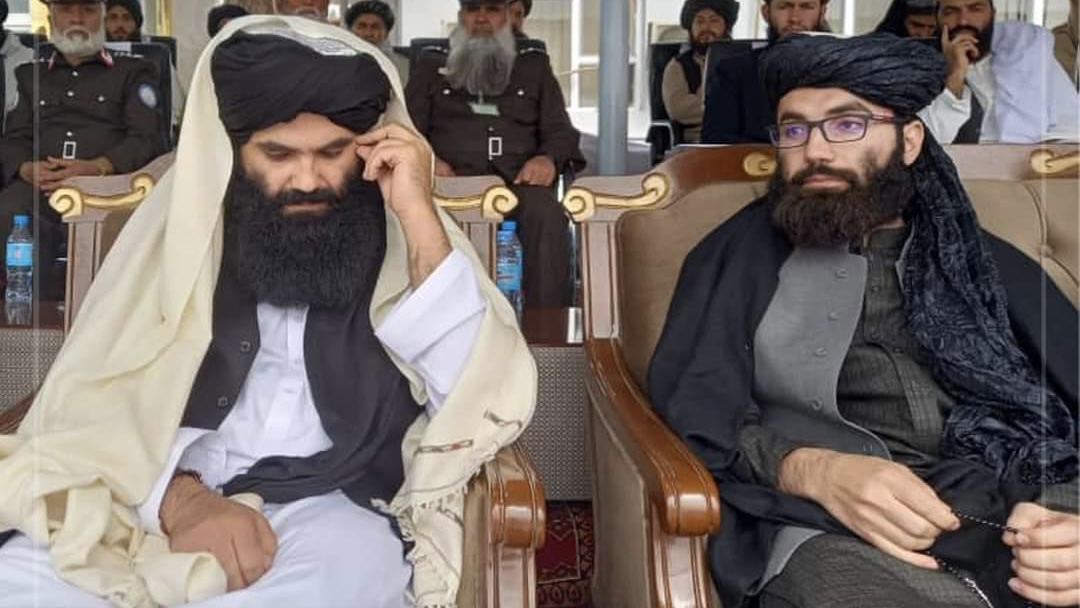
Afghanistan's acting Interior Minister Sirajuddin Haqqani and his younger brother Anas Haqqani are seen sitting together at the National Defense Police Academy in Kabul, Afghanistan on March 5, 2022. (IEA)
Born in December 1979, Haqqani is the second of the seven sons of the first wife of the late Taliban leader and founder of the Haqqani Network, Mawlawi Jalaluddin Haqqani. Jalaluddin’s eldest son, Nasiruddin Haqqani, commonly known to the family and the Taliban as ‘Doctor Nasir,’ was shot dead by unidentified assailants in Islamabad, Pakistan in 2013.
Sirajuddin Haqqani lost three other brothers in the Afghan war. Badruddin Haqqani, who is still described by the Taliban as one of their most capable strategists and who was famous for preparing suicide bombers and vehicle-based explosive devices, was killed in a US drone strike in North Waziristan, Pakistan in 2012.
Muhammad Haqqani was killed in a US drone strike in North Waziristan in February 2010, while their youngest sibling, Omar Haqqani, was killed in a US military operation in Khost province in Afghanistan in July 2008.
Besides Sirajuddin Haqqani, Abdul Aziz Haqqani and Anas Haqqani are the only living sons of Jalaluddin Haqqani from his Pashtun wife. His other wife, of Arab origins, has been living with her children in her home country for a long time.
Like all his siblings, Haqqani also received his early education from his father. In 1984, he enrolled at a religious seminary, Anjuman Uloom Al-Qur’an, in northwestern Pakistan at the age of five.
“After completing his religious education, he remained close to his father in most of his journeys during the Mujahideen’s fight against the USSR, which influenced him a lot,” Sheikh Muhammad Saqib, a close friend of Jalaluddin Haqqani and a trusted aide of Sirajuddin Haqqani, told Arab News.
“Among all the siblings, Khalifa resembles his late father the most in many qualities.”
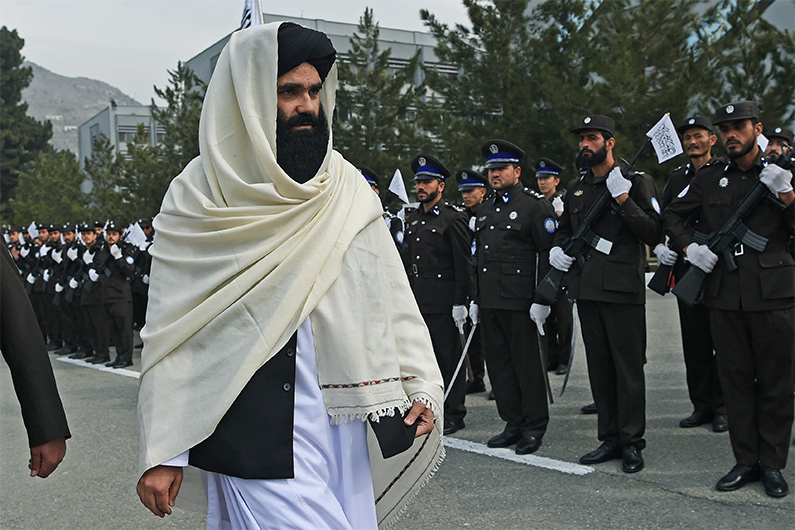
Taliban Interior Minister Sirajuddin Haqqani reviews new Afghan police recruits standing in formation during a graduation ceremony at the police academy in Kabul on March 5, 2022. (AFP)
Haqqani fought alongside the Taliban for the first time in 2003 and led his first attack against the US forces in Jawar, Khost in 2004. He was later appointed by the Taliban as the shadow governor for Khost province in 2006.
His name cropped up in the media for the first time after the January 2008 attack on Serena Hotel in Kabul, wherein six people were killed, including a US national.
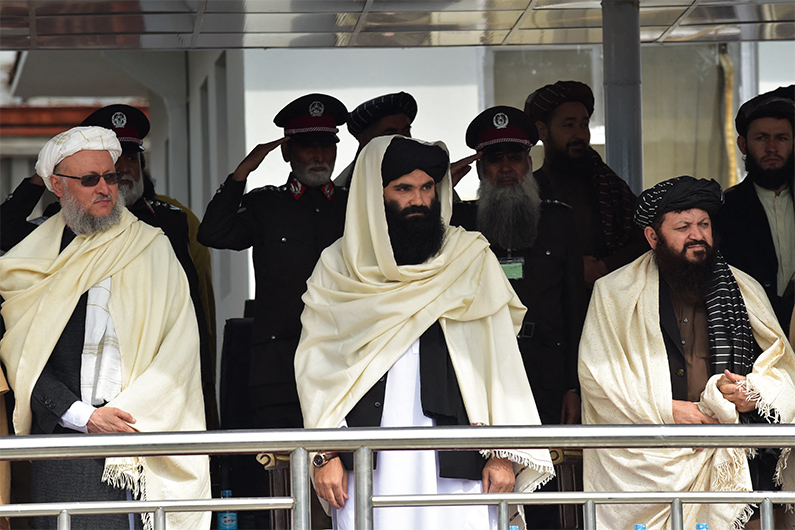
Taliban Interior Minister Sirajuddin Haqqani (C) and Deputy Prime Minister of the Taliban Abdul Salam Hanafi (L) attend a graduation ceremony for new Afghan police recruits at the police academy in Kabul on March 5, 2022. (AFP)
Later he became one of the most wanted persons to the US and the Federal Bureau of Investigation (FBI) placed a reward of $10 million on his head.
Sirajuddin, like his father, added ‘Haqqani’ to his name for being a graduate of the famous Pakistani religious seminary, Dar-ul-Uloom Haqqania in Akora Khattak near Peshawar.
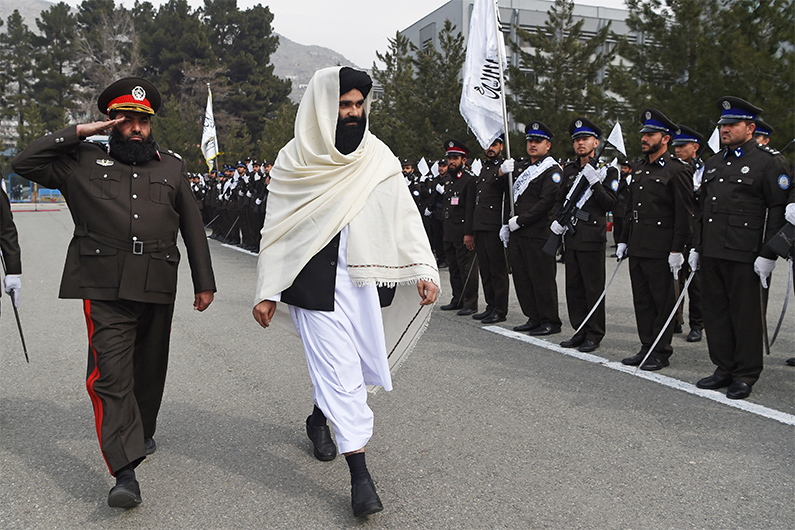
Taliban Interior Minister Sirajuddin Haqqani reviews new Afghan police recruits standing in formation during a graduation ceremony at the police academy in Kabul on March 5, 2022. (AFP)
In 2009, the Haqqani Network kidnapped US soldier Beaudry Robert ‘Bowe’ Bergdahl. Bergdahl was released in exchange for five Taliban commanders imprisoned at Guantanamo Bay in Cuba in May 2014.
Journalist Mushtaq Yusufzai, who has interviewed Haqqani more than once, says Haqqani never accepted that his network was a separate group, but for him it was part of the Taliban.
“I interviewed him for the second time in 2009 and asked him why he was sought after by the Americans,” Yusufzai recalled. “’I must have hurt them badly’ was the reply by Sirajuddin Haqqani who was probably 28 at the time.”
















